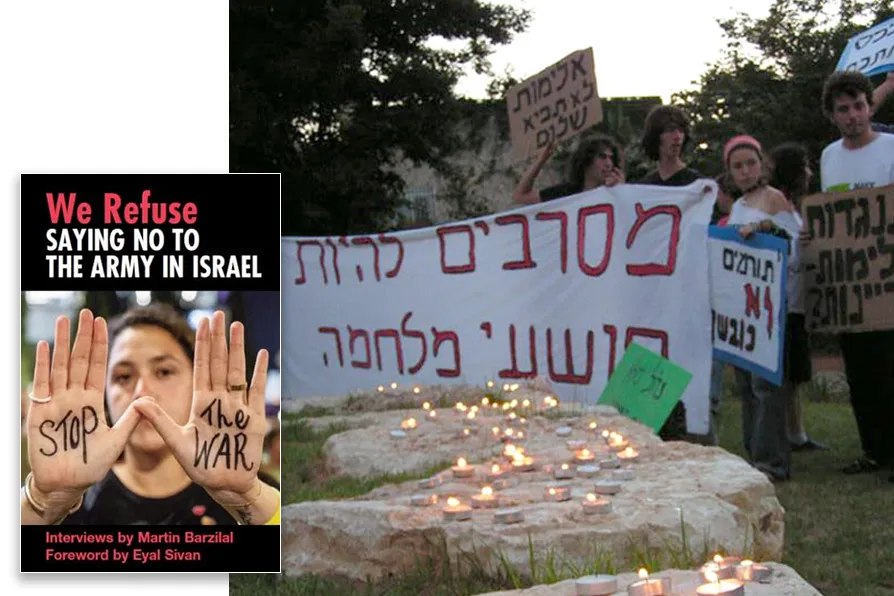For his study of anti-Muslim Muzaffarnagar Riot, HENRY BELL applauds Joe Sacco for a devastatingly effective combination of graphic novel and investigative journalism
TOM PIERSCIONEK recommends a remarkable series of interviews with those few and brave Israeli citizens who refuse to do military service

 Demonstration of Israeli refusniks in July 2006, in front of Dan Halutz, the then head of the IDF. The banner reads: “Refuse to be war criminal" [Pic: user:Eviv/CC]
Demonstration of Israeli refusniks in July 2006, in front of Dan Halutz, the then head of the IDF. The banner reads: “Refuse to be war criminal" [Pic: user:Eviv/CC]
We Refuse: Saying No to the Army in Israel
Martin Barzilai, Green Print, £9.99
IT takes great courage, resolute determination and a deep level of critical thinking to reject an idea to which you were exposed since childhood, one continually reinforced by your family, friends, education system and government. This is especially so if opposition to the ideology may result in ostracism or imprisonment.
Photographer and journalist Martin Barzilai interviewed a diverse range of Israeli men and women who defied societal expectations by refusing to serve in the Israeli Defence Forces (IDF). Many subsequently faced sanctions, including prison or being deemed traitors, for refusing to follow the expectations of a highly militarised society.
Each refusenik has a unique story to tell; they come from a variety of backgrounds. Some interviews were conducted years ago, others more recently. Most include a follow up interview after the October 7 attack to ascertain its impact upon their views and decision to refuse military service.
Some of those interviewed refused to adhere to a military summons from the outset. This group is typically comprised of young adults who had encountered and formed friendships with Palestinians during their formative years; some also grew up in progressive Israeli households. Such factors appear to have given them a degree of immunity to Israeli state propaganda that deems military service sine qua non for all eligible citizens.
Other interviewees are former soldiers, including ones who served in elite regiments such the Sayeret Matkal, who joined the IDF willingly and initially believed they were defending Israel from its enemies. Their experiences serving within the occupied territories gradually changed their views towards Palestinians, the role of the IDF and the Israeli state.
Surprisingly, even within a highly militarised society, reportedly less than 60 per cent of Israelis actually complete military service. Palestinian citizens of Israel and most Haredim are excluded from conscription; others are exempted due to physical or psychiatric illness.
While Israelis deemed fit for military service may initially refuse enlistment by declaring themselves pacifists, they are then required to appear before a commission of mostly military figures that adopts an adversarial approach, especially against those believed to be refusing service for political reasons. If the commission does not consider the candidate a pacifist, they risk imprisonment for continued refusal. Whereas female conscientious objectors might be offered the chance to do “civilian service” instead of joining the IDF, this option is not open to males.
Some of those interviewed have served prison sentences (typically weeks or months), and sometimes repeatedly, for refusing to serve in the Israeli military. A few have since left Israel, while others consider it their duty to remain in the country and oppose the occupation from within.
Refuseniks are a diverse bunch; some refuse to serve in the IDF in any capacity (as they consider this tantamount to assisting the occupation of Palestine), others declare they will only serve within Israel’s borders and refuse deployment within what is considered Palestinian territory.
We also learn that since the October 7 attack, it has become much harder to be a refusenik. Those choosing this path now risk longer prison sentences or greater censure, concurrent with a large proportion of Israeli society throwing their support behind a government that includes openly far right ministers.
The brave Israelis who refuse to serve in the IDF deserve the international community’s support, especially considering the hostile climate in which they now find themselves. Certain countries in Europe, such as Germany and Britain, have seen pro-Palestinian activists smeared, censured or arrested. Yet the pressure European activists face seems trivial compared to the risks taken by a (thus far) minority of brave Israelis who refuse to march alongside the majority and choose instead to stand up to the occupation. Their stories need to be told.









